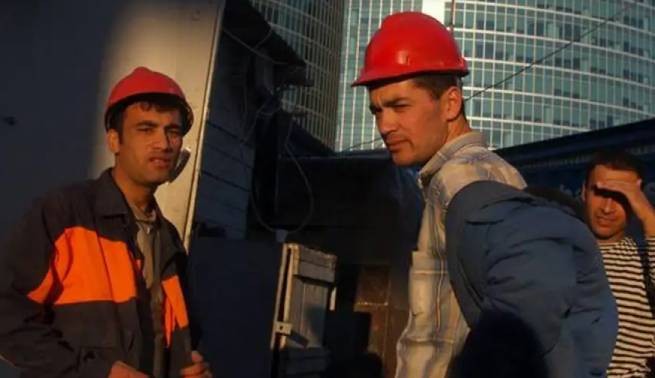Immigrants from Central Asia, after the terrorist attack in Crocus City Hall with numerous victims, faced open xenophobia in the Russian Federation. Security forces are conducting raids, and politicians are calling for stricter immigration laws.
Messages similar to the one indicated in the title came to many taxi drivers after terrorist attack to the concert hall in Krasnogorsk near Moscow. Migrants from Tajikistan began to be expelled en masse from Moscow.
The number of cases of violation of the rules of entry into Russia by foreigners has sharply increased (Article 18.8 of the Administrative Code). Since the morning of March 25 in the courts of the capital, writes The Moscow Times registered 784 such decisions, while there were 1,106 of them in the entire last week. We are mainly talking about the expulsion of foreigners from the country.
Courts provide decisions without passport data, so it is impossible to conduct an accurate analysis of the citizenship of violators. But according to the publication, special attention is paid to natives of Tajikistan. A lawyer who often works with citizens of this country said, for example, that just last Monday in one of the district courts of the Russian capital there were more than 100 people awaiting consideration of cases under this article. He says:
“The police chase almost all migrants on the street, especially if they have Tajik passports. Everyone is taken to the department and checked.”
However, a passport is not the main criterion. They also pick you based on your appearance. Human rights activist Svetlana Gannushkina told The New York Times that she is now trying to help one citizen of Tajikistan: the police are “looking for Tajiks” and detained him because “they saw a man with that appearance.” Migrants, she said, are needed by the Russian authorities “as cannon fodder” for the war in Ukraine “and as labor force”:
“And now, when they need to carry out the plan to combat terrorism, they will also hunt for this group and the Tajiks in particular.”
Tajik migrants in Moscow now fear not only deportation. They especially fear that they will be sent en masse to fight in Ukraine “as a kind of revenge on the Tajik people,” human rights activist Saidanvar, who recently left the Russian capital, tells the publication.
In total, in Russia, according to data for 2023, about a million citizens of Tajikistan are registered as migrant workers. After attacks Raids on migrants have intensified at Crocus in Russian cities. In the capital, police organized raids on dormitories. Security forces also raided the Wildberries warehouse in Elektrostal near Moscow. About five thousand employees came under scrutiny, and at least forty people were detained.
In telegram chats and Tajik VKontakte groups they write that Moscow has intensified checks of immigrants from Central Asia. One of the users says, quoting Gazeta.ru:
“Those who do not have all the documents are better off not leaving home. I myself was in Moscow today. <…> I was stopped. The check is very strict. The situation in Moscow is bad. I recommend that people here not leave home again.”
Representatives of the Tajik diaspora expect mass expulsion of their compatriots amid the arrest of those accused of the terrorist attack – seven of the eight detained in the case of the attack on Crocus City Hall turned out to be natives of Tajikistan. According to the FSB, direct executors were Dalerjon Mirzoev (32 years old), Rachabalizoda Saidakrami Murodali (30 years old), Shamsidin Fariduni (25 years old) and Muhammadsobir Fayzov (19 years old).
Earlier, the head of the Tajik Cultural Center, Khursheda Hamrakulova, called the terrorists who carried out the massacre in the concert hall criminals without religion or nationality, and urged not to judge the entire nation by them:
“The people who committed this monstrous terrorist attack are not residents of Tajikistan, we renounce them.”
Over the past few days, ten regions in the Russian Federation have introduced restrictions on the work of migrants. The authorities of the Novgorod region, for example, banned foreigners with a license from driving taxis and buses, as well as selling alcohol. Previously, a ban on the work of migrants in certain industries was introduced in the Chelyabinsk, Magadan, Kaliningrad, Tula, Novosibirsk, Tyumen and Kaluga regions, as well as in the Khanty-Mansi Autonomous Okrug – Ugra and Yakutia.
At the same time, the State Duma proposed restricting the entry of migrants during the war with Ukraine. As Mikhail Sheremet, a member of the Committee on Security and Anti-Corruption, said, today the security forces do not have “time to figure out with what intentions” people enter Russia. At the same time, some migrants are “used blindly” to harm Russians, including turning them into “instruments” for carrying out terrorist attacks and other “destabilization of the situation,” the deputy argued.
Migrants from Central Asia fear violence from Russian society. Shortly after the terrorist attack suspects were detained, Russian far-right and Z-Telegram channels were filled with messages that called for violence against Central Asian migrants and proposed deporting them and their families.
Although xenophobia has long been a serious problem for Central Asian communities in Russia, many Tajiks speaking to DW shared fears that the situation will now become even worse for them. Abdullo, a fruit seller at a Moscow market and a citizen of Tajikistan, said that he had previously received xenophobic messages on social networks from time to time, but after March 22, hateful messages became more regular. “They are trying to threaten me on the Internet to force me to leave Russia. But I don't think about it because I won't be able to make a good living at home in Tajikistan,” he says.
https://www.youtube.com/watch?v=OzbwhpeKZSs







More Stories
A terrible tragedy in Kyrgyzstan: a truck hit 29 children at a festive event (video)
A 48-year-old Ukrainian was killed in Hungary
Paris: wild clashes between police and "black" block